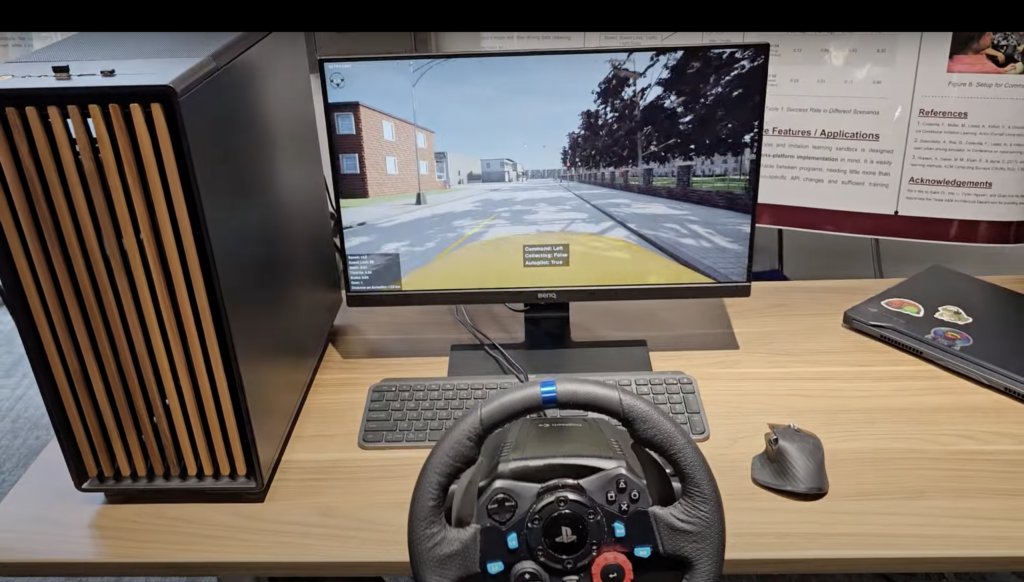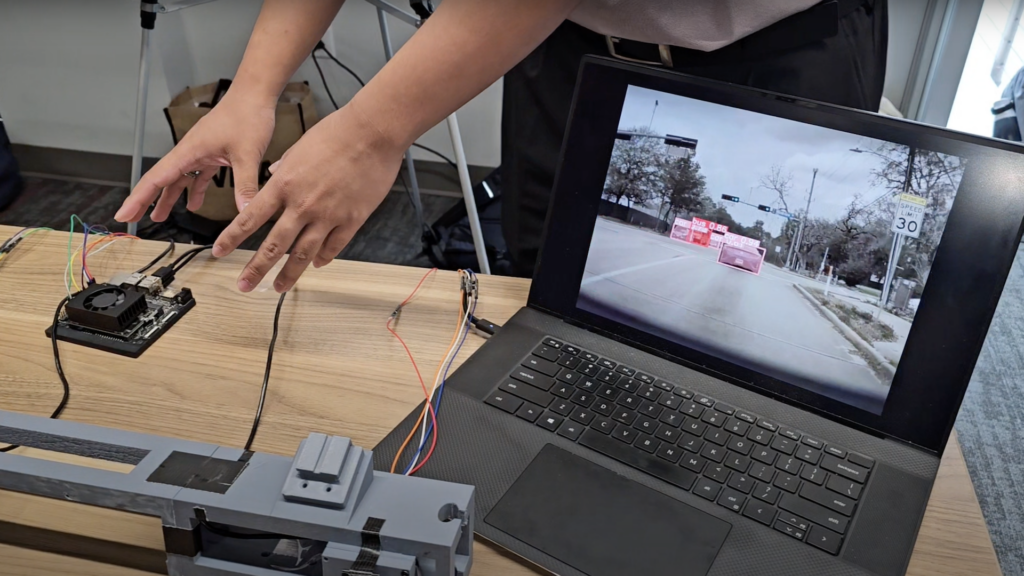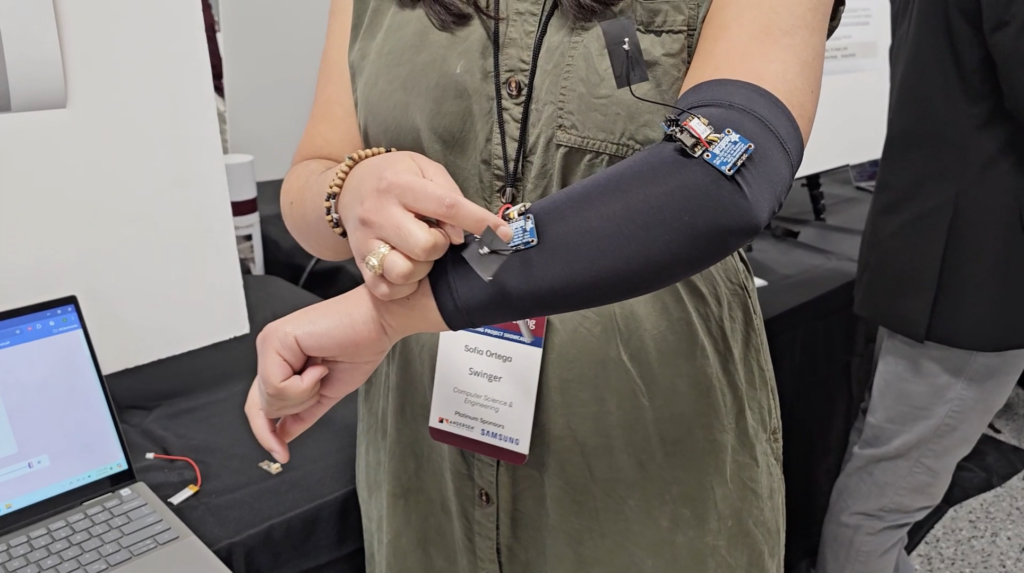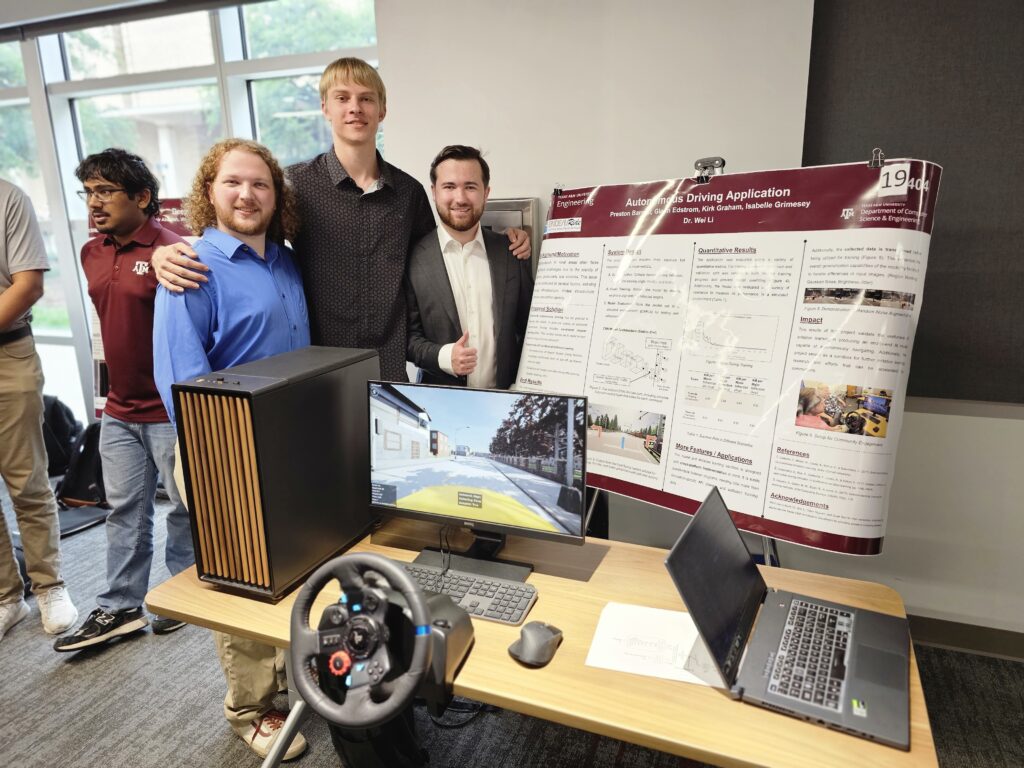By Heather Graham on May 16, 2024
The Texas A&M University College of Engineering exhibited work from 1,400 students on April 26, 2004, during its 12th annual Engineering Project Showcase at the Zachry Engineering Education Complex. The work, spread over four floors of the complex, represented capstone projects completed by over 300 teams of senior students from all engineering majors who were not only demonstrating comprehensive prototypes and projects but also competing for cash prizes from industry sponsors. Industry judges were on hand to view the showcase and hand out 18 prizes worth over $20,000.
The Texas A&M University (TAMU) College of Engineering senior capstone project is an annual, year-long experience designed to help Aggie engineers prepare for their future careers. The students must bring to bear all of their acquired knowledge and skills to solve a real-world problem, much as they will in professional industry positions. Students work in teams, reinforcing the teamwork skills required in industry design work. Industry members, fellow students, and members of the public come to view the designs and prototypes on display, which demonstrate the pinnacle of Aggie’s engineering ingenuity. The entire event is an opportunity for senior students to show their projects in an environment that combines skills of presentation, public speaking, networking, fluency, and interacting with the public.

Teamup was pleased to be on the ground at the showcase with both Teamup mentor professors and students, experiencing the diverse and impressive projects and prototypes on display. A few standout projects are detailed here.
One project solving a real-world and real-time problem is the Autonomous Driving Solution developed by a talented team of TAMU computer science students sponsored by the ENDEAVR Institute. ENDEAVR is a nonprofit seeking to “futureproof small communities” for emerging technologies like autonomous vehicles. The student team was mentored by Department of Computer Science and Engineering Professor Pauline Wade and ENDEAVR Project Managers Dylan Nguyen and Quan Sun, AICP. Student engineers Preston Barnett, Glenn Edstrom, Krik Graham, Isabelle Grimesey created an innovative application that leverages an advanced AI model to learn from real-world human driving behavior. This paves the way for more intuitive and adaptive autonomous driving systems. The work makes a significant impact on the future of transportation and contributes to the development of safer, more efficient, and user-friendly autonomous vehicles.
RetroPilot is another project generously sponsored by ENDEAVR Institute. Within this larger project, which develops low-cost autonomous systems for any vehicle using cameras, the Department of Computer Science and Engineering student team of Jeremy Bui, Siddesh Padala, Abhishek Sahu, Yvan Tonthat, and Brian Vu created their Video Stabilization and Object Segmentation systems. The prototype demonstrating these advanced features enables accurate perception and real-time decision-making for drivers of autonomous vehicles, which has the potential to transform the future of transportation.

All out of ideas for dinner once you get your autonomous car home? Just snap a photo of a raw ingredient (think: a pepper, an onion, or some fish), and the Computer Vision Based Recipe Recommendation System app will provide a variety of recipe recommendations tailored to your preferences. The system, developed by TAMU students Zia U., Ananth Kumar, Robbie Clark, and Rushil Aggarwal from the Department of Computer Science and Engineering, takes into account factors such as dietary preferences, available ingredients, and cooking expertise to give home cooks and foodies a foot up in recipe prep. It can also encourage users to try healthy food options and expand their culinary horizons.
If you have trouble drinking enough water during the day, look to the student team who tackled “smart hydration.” Under the guidance of Professor Paul Taele from the Department of Computer Science and Engineering, engineers Jacob Parker, Khanh Dao, Quenton Hua, and Hyder Ochsner created a smart water bottle system called uDrink. uDrink syncs a smart water bottle–the amount of water left in your bottle is indicated by colored lights around the bottom–to an app on your phone that tracks water consumption throughout the day and across days. It even has a leaderboard if competition between friends motivates you to stay hydrated!
You might need hydration after a long ride on your eBike. Sponsored by semiconductor manufacturer Texas Instruments, the eBike Drive Development project is poised to redefine sustainable transportation. Developed by Texas A&M students Bryan Ramos, Thomas Tyree, Aidan Yourk, and Matt Masters, the new design aims to overcome the consumer dilemma of trading off eBike longevity and performance, as well as replacing non-intuitive user interfaces. The team instead created a harmonious and user-friendly eBike that blends speed, efficiency, and long-range.
Another team–students Rishabh Ruikar, Monte Martin III, and Rawan Ibraheem, under the guidance of Professor Kevin Nowka from the Department of Electrical and Computer Engineering–designed the Guitar Entertainment System. This design simplifies the complicated traditional guitar amplifiers and effects systems into a plug-and-play app that can be used by any aspiring guitarist. Users can easily manipulate their sound with a unified guitar sound system that combines an amplifier, pedals, and a Bluetooth-connected app.
From swinging a guitar to swinging a club, bat, or racket, the capstone teams covered all manner of real-world dilemmas. Another student group working with Professor Paul Taele created the SwingMate prototype. Engineers Rishika A., Tonia H., Kinjal Khatri, and Sofia Ortega designed a user-friendly sensor that attaches to your arm and captures every nuance of movement, allowing the system to provide instant feedback and personalized recommendations for improvement of your swing. SwingMate reads out to a computer, so users can forgo specialized coaching or additional equipment.

The innovation and creativity experienced at the Engineering Project Showcase were astounding and prove that the future is in good hands. The next showcase will take place on April 25, 2025.
If you are interested in finding out more about the Texas A&M University College of Engineering, click here. To find out how Teamup is contributing to technology builds at the high school and university levels, click here.
Teamup is a 501 c(3) non-profit organization that promotes project-based learning and empowers students to build technology focused on driving positive social change.

